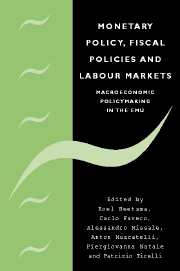Book contents
- Frontmatter
- Contents
- List of figures
- List of tables
- List of contributors
- Acknowledgements
- Editors' introduction
- Part I Monetary policy
- Part II Fiscal policies
- Part III Labour markets
- 11 Monetary institutions, monetary union and unionised labour markets: some recent developments
- 12 Inflationary performance in a monetary union with large wage setters
- 13 On the enlargement of currency unions: incentives to join and incentives to reform
- Index
11 - Monetary institutions, monetary union and unionised labour markets: some recent developments
from Part III - Labour markets
Published online by Cambridge University Press: 22 September 2009
- Frontmatter
- Contents
- List of figures
- List of tables
- List of contributors
- Acknowledgements
- Editors' introduction
- Part I Monetary policy
- Part II Fiscal policies
- Part III Labour markets
- 11 Monetary institutions, monetary union and unionised labour markets: some recent developments
- 12 Inflationary performance in a monetary union with large wage setters
- 13 On the enlargement of currency unions: incentives to join and incentives to reform
- Index
Summary
Introduction
This chapter is a selective survey of recent developments regarding the strategic interaction between labour unions and the monetary authority. Since Rogoff's (1985) influential work a basic tenet of the literature on strategic monetary policy with competitive labour markets is that, abstracting from stabilisation policy, the level of central bank conservativeness (CBC) affects inflation but not real variables. An important general message of the burgeoning literature on unionised labour markets and monetary institutions is that, when wage settlements are centralised within a small or moderate number of unions, CBC affects inflation as well as real variables like unemployment, output and real wages. This insight and the analytical frameworks that underlie it are particularly relevant for European economies in which the fraction of the labour force covered by collective agreements is large and in which wage-bargaining institutions are frequently rather centralised.
Most of the recent literature on the strategic interaction between the central bank (CB) and unions shares two basic presumptions. First, nominal wages are contractually fixed for a certain period of time, to which I shall refer as the ‘contract period’. Second, monetary policy and prices can be adjusted during the contract period. Casual observation supports both presumptions. Union nominal wages are normally fixed for at least one year while prices and the money supply are usually adjusted at intervals that are shorter than one year.
- Type
- Chapter
- Information
- Monetary Policy, Fiscal Policies and Labour MarketsMacroeconomic Policymaking in the EMU, pp. 299 - 326Publisher: Cambridge University PressPrint publication year: 2004
- 14
- Cited by



